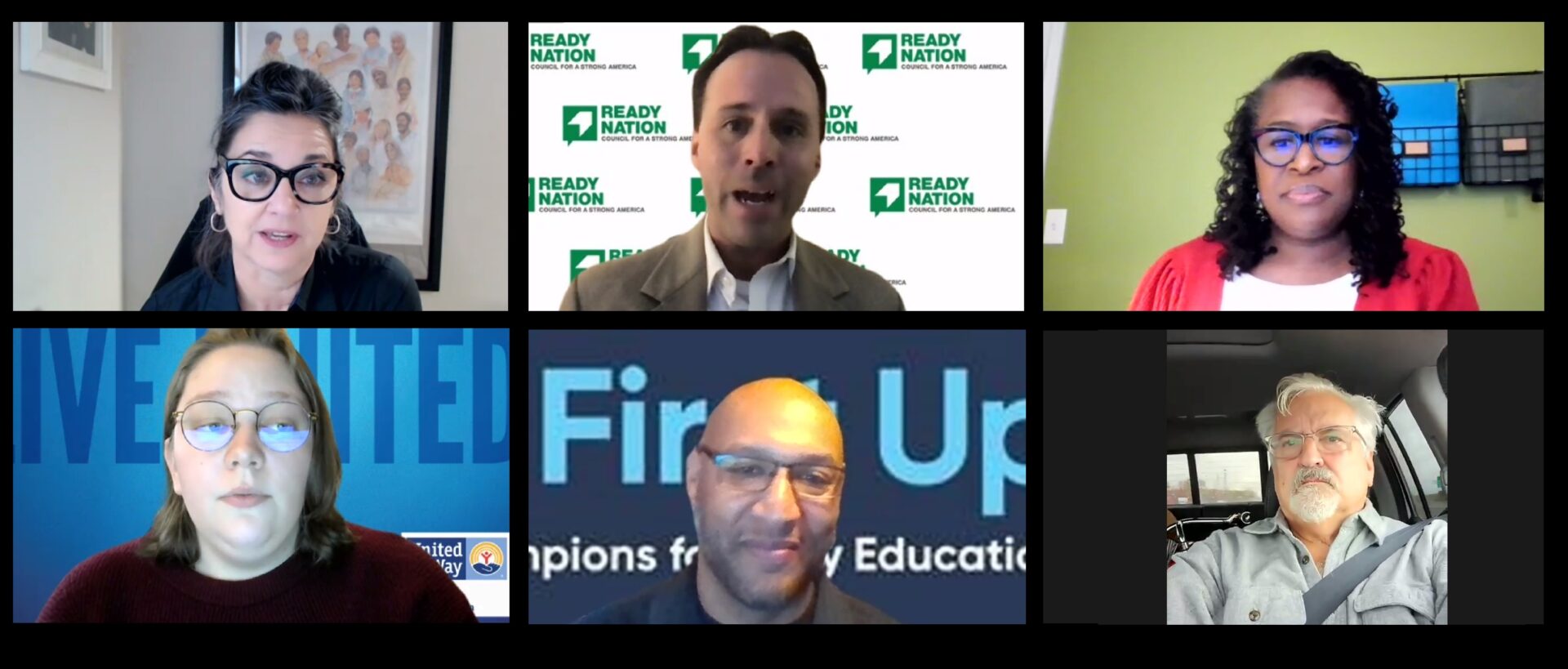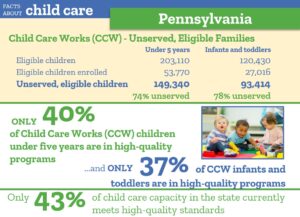
Major public investments are needed to provide high quality child care to the families who need it, advocates contended during an online forum Friday morning.
Parents, children, child care providers and their employees are all poorly served by the current system, which was in crisis even before the coronavirus pandemic pushed it to the breaking point, they said. Fixing it, they said, will yield significant across-the-board benefits for working Pennsylvanians and the state's economy.
Today, the lack of affordable child care is keeping parents, particularly women, out of the work force, and "jeopardizing our economic recovery," said Steve Doster, Pennsylvania director for the Council for a Strong America.
"You cannot bring back an economy if you don't have high quality care and education for our children," said Tyrone Scott, director of Government & External Affairs for First Up.
Better long-term outcomes
Doster and Scott were among the six panelists in the latest "Conversation About OUR Community," a series sponsored by the United Way of Lancaster County. Deb Jones, the nonprofit's director of community initiatives, moderated the 90-minute event.
Research shows the benefits of high-quality child care, including better health, education and career outcomes for children and higher incomes for parents whose time is freed up to join the work force, said Kimberly Early, director of Public Policy & Advocacy at the Pennsylvania Association for the Education of Young Children.
The coronavirus pandemic, however, has battered the industry. From the start of the pandemic through October, Pennsylvania suffered a net loss of 255 child care program, along with nearly 300 more that are temporarily closed, Early said, citing state data.
A recent survey of providers by Start Strong PA, a child care advocacy coalition, found that 92% are experiencing staffing shortages. Nearly 26,000 Pennsylvania children are on waiting lists, while another 34,000 children could be served if all providers were fully staffed.

Low pay, high cost
The panelists agreed the low pay for child care staff — in Pennsylvania, it averaged $10.69 per hour as of 2019 — makes hiring and retention difficult and discourages even the most motivated workers from staying in the field.
At the same time, the cost of care is high, averaging $1,200 a month for two children home-based care and up to $1,600 a month at a high-quality center, according to United Way of Pennsylvania.
That's a huge burden for working parents and is frequently a family's largest expense, said said Rebecca O'Shea, United Way of Pennsylvania's advocacy engagement coordinator.
Only a fraction of eligible parents participate in Child Care Works, Pennsylvania's subsidy program, and reimbursement rates are low. Private-pay clients thus end up subsidizing clients who are funded through the subsidies, said Stacie Blake, CEO of YWCA Lancaster, which is a child care provider.
The Biden administration's Build Back Better Act proposes to raise wage rates significantly while promoting affordability by subsidizing child care for most families. For all involved, it would represent "a giant step forward," O'Shea said.
O'Shea kicked off the forum with a presentation on the United Way's "ALICE" research, showing the difficulties working-class Pennsylvanians have in making ends meet, and the ways in which the pandemic stressed them further. "ALICE" stands for "Asset-Limited, Income Constrained, Employed."
Build Back Better's changes would be phased in over three years. When fully implemented, families earning up to 75% of state median income would be eligible for free child care. There would be copays above that level, increasing with family income to a maximum of 7% at 250% of state median income.
Other components provide for higher payment rates and staff wages, quality metrics, facility retrofits and staff training. Funding nationwide for the first three years would total $100 billion.
Polls show strong support for expanding child care availability. Business groups, too, say it would reduce barriers to employment. The libertarian Cato Institute, though, warns of its expense, its potential to crowd out child care models that don't fit its framework, and the incentives it creates for families to stay below the income limits of its tiered subsidy structure.
Learn more / Get involved
United Way of Pennsylvania, First Up, Council for a Strong America and the Pa. Association for the Education of Young Children are partner organizations in:
- Pre-K for PA: Advocacy coalition for universal high-quality pre-kindergarten.
- Start Strong PA: Advocacy coalition for affordable universal child care for ages 0 to 3.
Advocacy encouraged
Doster's organization aims to bring "nontraditional" child care advocates into the conversation, including business leaders and former military personnel. They see the importance of child care in retention and recruitment, he said: When the Military Child Care Act raised child care pay and standards, it reduced turnover dramatically. Today, the armed forces have the country's largest child care system; Council for a Strong America sees it as a model for Pennsylvania.
The panelists urged their audience to contact their legislators about child care and Build Back Better.
State Rep. Mike Sturla, D-Lancaster, recommended reaching out to organizations who can speak to the issue, such as employers or parent-teacher associations. When lawmakers hear from someone representing hundreds or thousands of people, he said, "they start to pay attention."
Doster advised asking political candidates about child care and early learning and called for making them priority issues in next year's elections. Just staying informed on the issues is helpful, Scott said.
O'Shea predicted that implementing Build Back Better's child care provisions will yield a robust economic dividend.
"When you have a strong middle class, it benefits everyone," she said.
(Editor's Note: United Way of Lancaster County sponsors One United Lancaster.)





